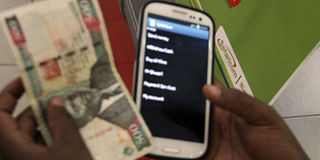Need to rethink boycotting Safaricom

A customer pays for goods at Uchumi supermarket, Nairobi, through M-Pesa on January 27, 2015. M-Pesa is a mobile bank that is open anywhere and anytime. PHOTO | DIANA NGILA | NATION MEDIA GROUP
What you need to know:
- Without mobile data and voice services, Kenyans, including those in Nasa’s support base cannot communicate.
- The decision to shun services offered by Safaricom will hurt a sizeable population in Nasa strongholds.
Over the past three decades the global use of the internet has risen exponentially.
Internet connects billions of people for all kinds of economic, social and political activities.
The world has become so intricately meshed with internet to the extent that last year, the UN declared that “online freedom” is a “human right”, and one that must be protected.
INTERNET FREEDOM
Even before the UN made this pronouncement, some countries had already raised their bar for internet access.
For example, Estonia passed a law in 2000 that declared access to the internet a basic human right.
In 2009, France followed. Legislators in Costa Rica, in 2010, reached a similar decision.
In 2009, Finland, passed a decree stating that every internet connection needs to have a speed of at least one Megabit per second, or broadband.
BOYCOTT
These are just a few examples to underline that the contribution of internet to the economic growth of countries cannot be overstated.
It therefore came as surprise when National Super Alliance (Nasa) leadership, in its protest against the manner in which this year’s election was conducted, asked its followers to boycott Safaricom services.
This action may have gone a tad too far. This is why.
Safaricom is the largest provider of phone and data communication services in the region.
COMMUNICATION
Its infrastructural network has tentacles all the way into some of the remotest villages and towns.
The company has the means to maintain their infrastructure and keep the services buzzing.
Where its connection is spotty, people buy SIM cards from other companies that may provide better connection.
Many people in those communities do not have a choice. Safaricom may be their only choice to connection.
Without mobile data and voice services, Kenyans, including those in Nasa’s support base cannot communicate.
Without communication, the opposition cannot easily reach and mobilise them to rally behind a cause.
ECONOMIC GROWTH
Without reliable internet services, certain pockets of the country remain in the dark, unware of subtle information that would not otherwise be broadcast through the national media.
The boycott amounts to disruption of citizens’ access to internet and by extension, clipping the widespread economic opportunities that stem from internet connection.
Through M-Pesa, for example, Safaricom provides means by which people pay their bills or receive their payments for services they have rendered.
Simply put, M-Pesa is a mobile bank that is open anywhere and anytime.
It provides a ready mechanism for individuals, small and large enterprises to do business.
SERVICES
In a politically fragile country like ours, we need convenient means to send and receive money, especially during moments of crises.
Currently, that option is M-Pesa. In the 2007/2008 post-election violence, for example, M-Pesa was used to transfer money to people trapped in trouble spots who urgently needed means to get out of harm’s way.
For those in business, M-Pesa offers loans and savings products, and is used by many companies and individuals to disburse salaries or pay bills, which saves users’ time and money compared to doing so from banks.
EMPLOYMENT
If the boycott of Safaricom services in the opposition strongholds is obeyed, a significant number of the over 20 million Kenyans who use M-Pesa would be hard-pressed to find new alternatives.
The same would go for a big chunk of 90,000 agents and company employees working in those areas.
All these people would find themselves on the streets, jobless and economically worse off than they were before the election.
The decision to shun services offered by Safaricom will hurt a sizeable population in Nasa strongholds more than it will hurt the company.
It is therefore imperative that Nasa rethinks this method of punishing Safaricom.
Using the wisdom of its experienced lawyers, economists and businessmen, Nasa can exploit other options to force Safaricom to atone for its alleged transgressions without closing the economic taps of supporters.
The writer is an informatics specialist. [email protected]. @samwambugu2





